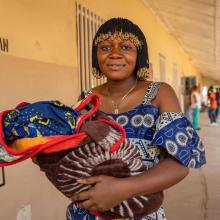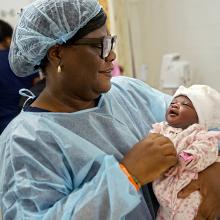Maternal Health
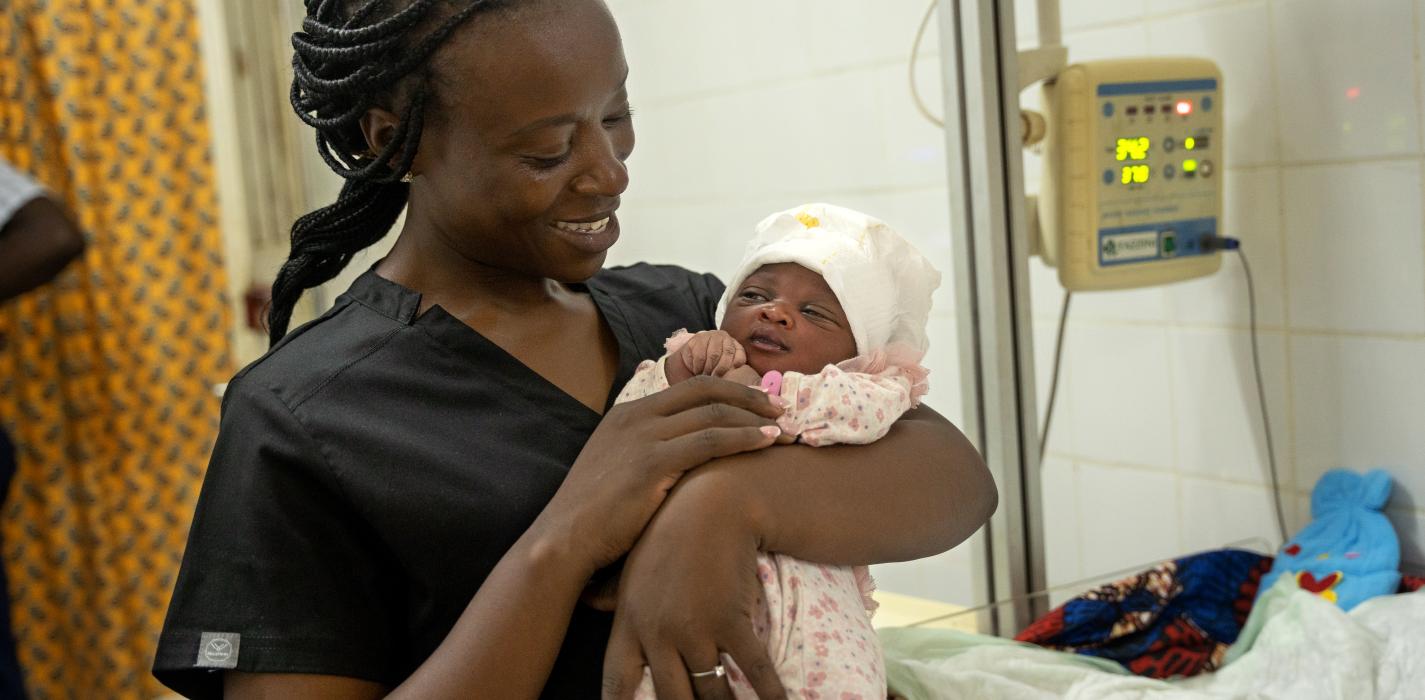
PIH-SL is improving maternal, newborn, child, and adolescent health services at health facilities, and connecting women in the communities to quality care.
Our Impact
Maternal and newborn health outcomes in Sierra Leone have improved significantly in recent years, with maternal mortality rates decreasing drastically.
-
3,108women
gave birth across Koidu Government Hospital and Wellbody Clinic in 2025
-
922infants
were cared for at the Special Care Baby Unit in 2025
-
38%increase
in the number of family planning consultations from 2024 to 2025
Koidu Government Hospital
Contributing to and building on the successes of the decreasing maternal mortality rates, PIH-SL has made progress through comprehensive initiatives across Kono District at KGH, Wellbody Clinic, and in the communities. From 2020 to 2025, KGH saw a remarkable 69% increase in women choosing to deliver their babies at the facility. In 2025, over 2,700 deliveries took place at the hospital and 44% of deliveries were caesarean sections (C-sections). The percentage is high because KGH is a key referral facility for pregnancy complications, which often lead to a C-section. Well-trained staff are ready to handle complications that arise during childbirth.
Maternal Center of Excellence (MCOE)
As an extension of Koidu Government Hospital the MCOE is a state-of-the-art facility for quality care delivery, innovation, and a model for training the next generation of health care workers.
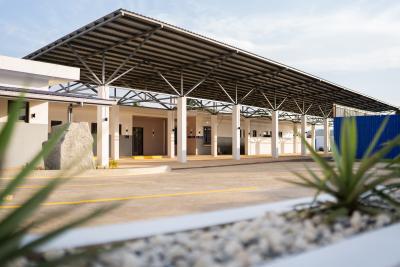
The Maternal Center of Excellence at Koidu Government Hospital will advance maternal and newborn care in Sierra Leone.
Sean Andrew Bangura / PIH
Special Care Baby Unit (SCBU)
The SCBU provides the highest standard of neonatology care for neonates born at KGH, as well as those born outside of the hospital, with a dedicated space and trained pediatricians to provide care. Designed for pre-term babies, sick neonates, and babies that require other specialized care, the SCBU is highly valued and has increased the survival of neonates. In 2025, over 900 babies were treated, cared for, and nursed to health.
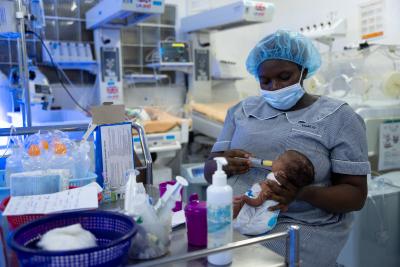
The Special Care Baby Unit (SCBU) at the PIH-supported Koidu Government Hospital (KGH) is a specialized unit that provides advanced, lifesaving care for newborns.
PIH / Caitlin Kleiboer
Innovative Care
In 2024, an innovative approach was introduced at KGH, Wellbody Clinic, as well as Sewafe and Kombayendeh Community Health Centers – the Janitri fetal monitoring technology. The device enhances maternal care by providing continuous, real-time monitoring of fetal heart rates during labor, allowing health care providers to swiftly identify and respond to potential complications, thereby improving outcomes for both mothers and their newborns.
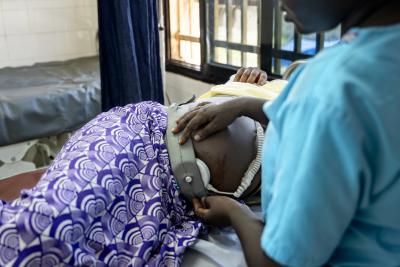
The fetal monitoring technology Janitri enhances maternal care by providing continuous, real-time monitoring of the fetal heart rate during labor.
AbuBakarr Tappiah Sesay / PIH
Adolescent and Youth-Friendly Services
Through the Adolescent and Youth Friendly Services (AYFS) at KGH, young people have access to confidential and non-judgmental health care services. This ensures that their unique needs and rights regarding sexual and reproductive health are met effectively. In 2025, over 6,300 young people visited the AYFS clinic at KGH. Outside the clinic, the team conducts school visits, facilitates school clubs, and meets with young people out of school to ensure continuous education on sexual and reproductive health.
Family Planning
Family planning support and cervical cancer screenings are offered across Kono district. In 2025, family planning consultations increased by 38%, with contraceptive implants being the most popular method of birth control. Almost 50% of women opted for this form of long-acting reversible contraception. In Sierra Leone, cervical cancer is the second most common form of cancer. Cervical cancer screenings are crucial to detect early signs of the disease and to provide timely interventions. In 2025, a total of 2,120 women were screened and 216 were referred to receive follow-up care.
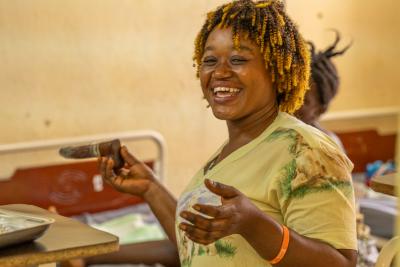
Nurse Patience is talking to women recovering from a C-Section about family planning at Koidu Government Hospital.
Chiara Herold / PIH
Community Programs
In the community, Traditional Birth Attendants (TBAs) work with women, accompanying them to clinical appointments and creating trust in the health care system. PIH-SL has recruited and trained 191 TBAs who provide health education and accompaniment for mothers in their communities. In 2025, TBAs made over 110,00 visits connecting pregnant women to health care, helping to reduce the number of obstetric complications, stillbirths and, maternal deaths in Kono District, a remarkable 209% increase from the previous year.
When emergency cases are detected at Peripheral Health Units in the communities, time is of the essence. To ensure quick referrals to KGH, PIH-SL supports the National Emergency Medical Services (NEMS) with fuel to operate their ambulances. NEMS ambulances are strategically positioned across key locations in the district to ensure a prompt response. In 2025, 562 pregnant women were brought to KGH, helping to save the women’s and babies’ lives.
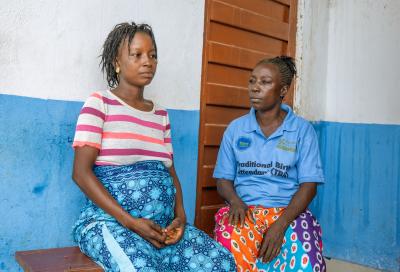
Gladys Abu, a traditional birth attendant accompanies expecting mother Mary to a community health post for an appointment.
AbuBakarr Tappiah Sesay / PIH
Quality Essential Health Services and Systems Support Project (QEHSSSP)
QEHSSSP enhances health care delivery at community health centers across rural districts, ensuring that patients receive vital services regardless of their location. The project focuses on improving maternal and child health outcomes for approximately 2 million people across Sierra Leone.

Mattia gave birth at Jojoima Community Health Center in Kailahun district.
Caitlin Kleiboer / PIH
